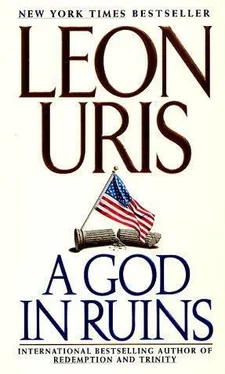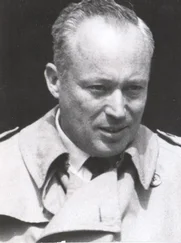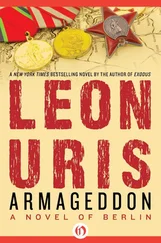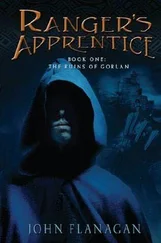“You said there were two reasons.”
“I had this SCARAB prototype built with composites. It is not an all-aluminum plane, and the radar cross section is very low.”
Now came an hour of caution, nitpicking, alternate ideas: we haven’t thoroughly tested the experimental missiles and bombs, the SCARAB has to be refueled in midair, we need a diversionary attack or a carrier hit from the Persian or Oman Gulf ... air cover .. . the condition of the Marine RAM team will be exhaustion after flying fifteen hours .. . and finally:
“No disrespect, Jeremiah,” General Bellicek said, “but aren’t you a little too enamored of those Israeli wing-and-a-prayer raids? They have to win. We have to plan it so as not to take losses.”
“Yeah, but they work,” Duncan retorted, “and the one goddamn reason
they work is because they aren’t cluttered up with all the Yankee bells and whistles. One plane, in and out, twenty fucking Marines.”
“But does the SCARAB have the legs, Jeremiah?” General Hoyt pressed. “You are going to fly under enemy radar in rocky terrain. These are gas-guzzling tactics.”
“/~v “
yumn.
“Yes, sir,” the gunner said. He clicked the carousel forward several slides and spoke. “Using a bad-case scenario, we can reach Fort Urbakkan, pull the raid, and fly out for a few hundred miles. We have called for a fuel tanker from Diego Garcia to rendezvous at thirty-one degrees, forty minutes latitude, fifty eight degrees, twenty minutes longitude. That will give us four hours till daylight to scramble south to the Arabian Sea and land aboard one of our container ships.”
“How many tanker-to-SCARAB refuels have you tried?” Admiral Clearfield asked knowingly.
Duncan looked away, miffed. “Two,” he peeped.
Back and forth, back and forth. It was the kind of plan that made the American military clutch. One mistake would mean a catastrophe. To let go of this opportunity could be a sign of over caution or a fear of casualties. The terrorist would remember an American balk.
Keith Brickhouse, commandant of the Marines, broke his silence. “The PLO, the Iranians, and the rest of those terrorist bastards will increase their activities. They are going to say that America just doesn’t have the capacity to stop them. We are capable of this mission. We will be in and out of there before the muezzin calls the Moslems to prayer in Teheran.”
“And you’ll wish to hell you had had fresh troops going in,” General Hoyt said.
“Fresh troops is an oxymoron,” Duncan answered. “I have never known men to reach battle or who fight battles as fresh troops. Wars are won by men less exhausted.”
Silence. With the specter of American casualties and a failure, the Joint Chiefs and the President were overburdened.
“From time to time, war to war, Americans have shown the utmost ingenuity and courage. Such a time and place is right here now,” the commandant said.
Fourteen hours and twenty-two minutes had elapsed since Iranian terrorists had taken an American Lear jet out of the sky. Overhead a giant C--5 jet transport carrying RAM and its sleeping SCARAB pressed toward the Tikkah Air Base on the far reach of Turkey.
Aboard the C-5 each member of the Recreation and Morale team was issued a packet of maps, personalized for each Marine’s participation in the raid.
The mission and the importance of Bandar Barakat was explained. Jeremiah called for map blowups and went over the plan, minute by minute, inch by inch. Many the day and week they had drilled in specific maneuvering that was now fitted inside the scheme of the raid.
Every Marine had secondary and tertiary duties. All of them could double as corpsmen. Nicknames and personal names only spoken now, no calling a person by his rank. This they had also trained for, and it was hallelujah time when they got to call Major General Jeremiah Duncan “Dogbreath.”
Gunner Quinn O’Connell was the Mayday pilot, bombardier, second backup on the electronic systems, corpsman, and backup navigator behind the pilots.
Grubb, the field commander, and squad leaders Ropo and Marsh, Novinski on electronics, and the pilots, Cherokee and IV, were networked through their helmets to Dogbreath and Quinn.
More intelligence photos. More weather information.
Now a weapons and ammunition check. The twenty Marines were going in with serious firepower.
Duncan snarled time and again, he had pressed the President so hard to make an instant strike, he might have bought a pig in a poke. Would it not have been better to have practiced a virtual raid for a week? They’d find out.
A mere sixteen and a half hours had elapsed since the terrorist attack. The C-5 flew quite close to where the Lear jet’s scattered bits and pieces floated on the waves below.
The plane veered off course, following international waters so as not to fly in an air space where permission would be required.
They did aerobic exercises in the C-5, hard, hard, hard, hard. Major Hugo Grubb was a monster for conditioning. He could make a man’s hand fall off with finger exercises.
Chow included beer! Three per Marine. It would slow down the heart thump, drown out the jumping nerve ends.
One more time they went through a step-by-step account of the coming strike.
Two films were set up, one straight and one porno. By dawn light everyone was in their canvas bunk, dead out, snoring so loud their sound nearly drowned out the jet engines.
NATO AIR BASE’TIKKAH’TURKEY
RAM-A arrived ahead of schedule and was whisked to an isolated hangar, where they were sealed in.
The men stretched, yawned, belched, scratched, and passed air, cracking their bones into alignment. Quickly awake, they unloaded their gear from the C-5 and laid their packs and weapons against a wall.
A hushed moment among the gathering as the SCARAB was rolled down the C-5 ramp. Lord, it looked so small and fragile, an infant being born from the gigantic cargo ship.
The wings had been turned on a pivot for travel, running from tail to cockpit. They were rotated into normal flying mode and clicked in.
Cherokee entered the plane and hit the thumb switch to raise the nacelles housing the engines and propellers. He set them at 75 degrees so the blades would be well clear of the deck. The long and powerful blades had an upside and a downside. Downside, all takeoffs and landings had to be made in helicopter mode. Downside, when firing missiles from under wing racks, they also had to be in helicopter mode. Upside, the plane was hush like quiet in flight and unlikely to be heard by the enemy.
Showers!
Slabs of beef for breakfast with pasta and gallons of orange juice and high-voltage chocolates.
Captain Novinski and his backup man, Master Tech Sergeant Roosevelt Jarvis, entered. They set up a mini display and command console, directly behind the pilots, activated and checked out systems and the display panels.
“SMAC?”
“Pretty as a picture.”
“SMAC locked in.”
“Matching area correlation?”
“A-Okay.” “NOE?” Jarvis checked the digital tracking map system.
Novinski and Jarvis were joined by the chief American navigator at the Tikkah Air Base. The three of them programmed in a flight plan. They activated the terrain-following multifunction radar that would take pulsations from the ground and compare them to their database and display their position to within a hundred feet.
The chief navigator pointed out choppy air corridors, hidden peaks, radar stations, and myriad dangers.
In the radio shack, the pilots received their radio frequencies as well as Russian and Iranian frequencies.
“Fellah?”
“Yo,” Corporal An war Fellah answered, taking a headphone set that
would include him in the command network. “When you get the red light,
Читать дальше












